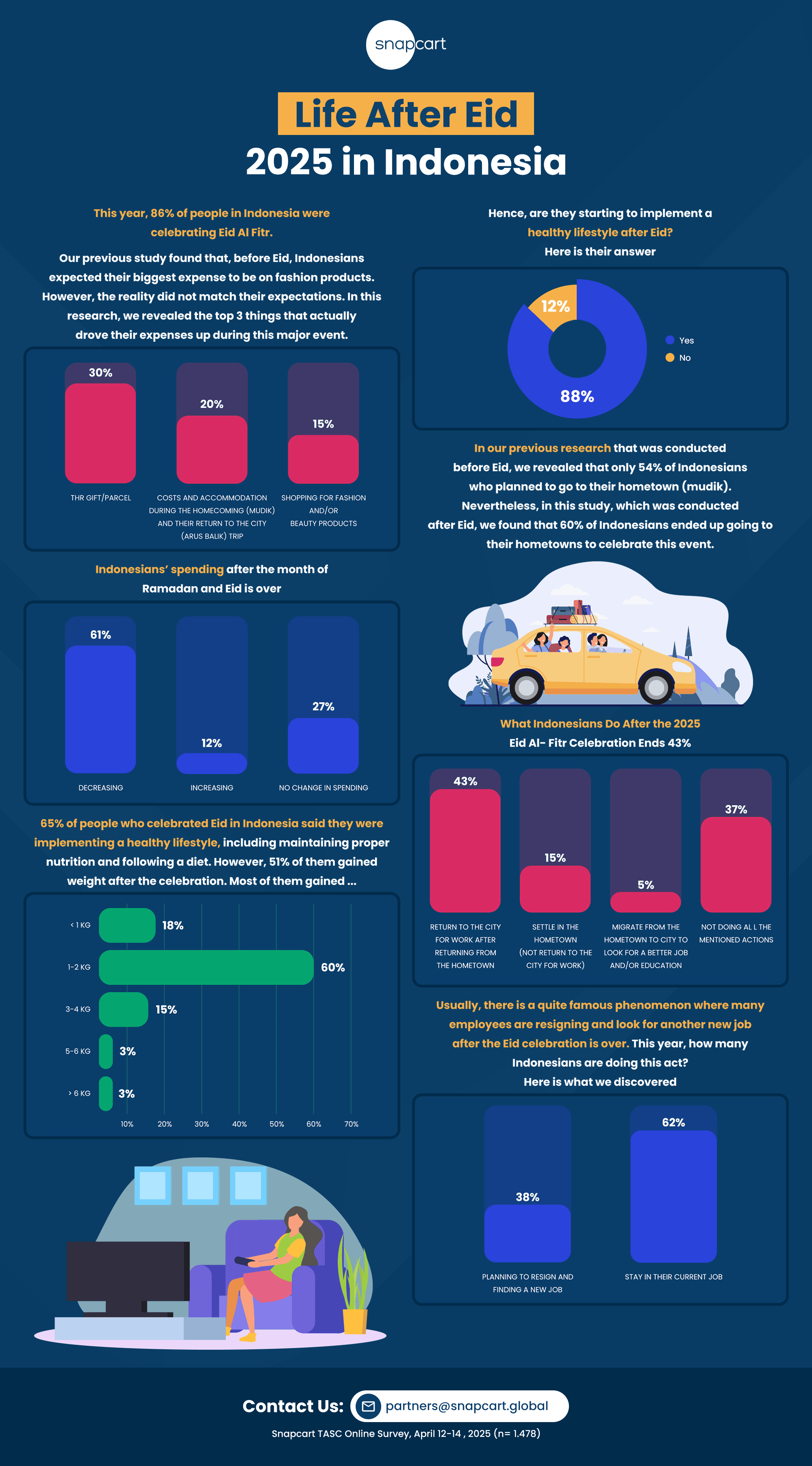As the holy month of Ramadan concluded and Indonesians celebrated Eid Al-Fitr in 2025, a wave of lifestyle, spending, and career changes followed.
Our recent survey that was conducted after the Eid celebration (between April 12–14, 2025) revealed how Indonesians adapted in the aftermath of one of their most cherished holidays. With 86% of Indonesians celebrating Eid this year, the post-celebration behavior offers unique insights into evolving trends across the nation.
Are viral phenomena such as people migrating from their hometowns to big cities and/or looking for new jobs after the Eid Al-Fitr celebration still popular in Indonesia this year?
Check out the result of our research below.

During and Post-Eid Spending Habits
Prior to Eid, many Indonesians expected their biggest expenses to be fashion-related [1]. Nevertheless, the actual spending told a different story.
Haifa, Business Development & Corporate Marketing Associate of Snapcart in Jakarta (17/4) said, “The highest expense category turned out to be THR gifts and parcels, making up 30% of total spending. These traditional holiday bonuses and tokens of appreciation clearly played a central role in the celebration.”
The second biggest expense was homecoming travel (mudik), including accommodation and the return trip to the city, which took up 20% of budgets. Fashion and beauty shopping still remained important, but only ranked third at 15%. This reveals that while looking good was part of the plan, gifting and reconnecting with loved ones took financial priority.
Furthermore, speaking of homecoming travel (mudik), our previous survey found out that only 54% of Indonesians said they planned to return to their hometowns for the celebration [1]. But after the event, our data revealed that 60% actually went home. This shift underscores the emotional significance of mudik, showing that many chose to reunite with their families, even if it wasn’t originally planned.
After the celebration, Indonesians made noticeable changes to their spending. A majority (61%) reported reducing their expenses following the festive season. In contrast, 12% saw an increase in spending, possibly due to extended holidays or delayed purchases, while 27% noted no change at all. These numbers suggest that many are aiming for financial recovery and balance after the intense spending period of Ramadan and Eid.
Health Goals vs. Reality
Maintaining a healthy eating lifestyle has always been a major issue during the Eid celebration. But in this survey, 65% of those who celebrated Eid said they were working toward a healthier lifestyle post-celebration, and this included maintaining a proper diet and being more mindful about nutrition. However, the reality proved challenging: 51% of respondents admitted to gaining weight after Eid. Most weight gain fell in the 1–2 kg range, although some gained as much as 3–6 kg or more. This highlights a common theme—while intentions are strong, holiday indulgences can make it difficult to stay on track with health goals.
However, encouragingly, 88% of Indonesians claimed they are now trying to implement a healthier lifestyle after Eid. Whether motivated by weight gain or the spirit of self-improvement, most respondents are focused on adopting better habits. Only 12% stated they were not pursuing any healthy lifestyle changes.
Life After Eid Al-Fitr 2025
When the celebration ended, the return to routine varied.
Our study figured out that 43% of respondents went back to the city for work after visiting their hometowns. Meanwhile, 15% chose to settle permanently in their hometowns, not returning to urban areas. And even though some news have reported that the percentage of travelers who invite their relatives to move into the city has increased significantly (from 17.8% last year, and this year is 31.5%) [2], we found that only a smaller percentage, around 5% of Indonesians who really decided to migrate from their hometowns to different cities in search of better jobs or higher education. Notably, 37% said they did not engage in any of these post-Eid actions, reflecting a diverse range of choices influenced by personal, economic, and social factors.
On the other hand, in recent years, it has become a popular phenomenon in Indonesia for employees to reconsider their jobs after Eid. But this year, we discovered that only 38% of Indonesians who said that they planned to resign and find a new job, meanwhile the majority of them (62%) still preferred to stay in their current roles, likely valuing stability in uncertain times.
For more information, contact us at partners@snapcart.global or haifa.chairunisa@snapcart.global.
Sources:
[1] https://snapcart.global/celebrating-eid-al-fitr-2025-in-indonesia/





